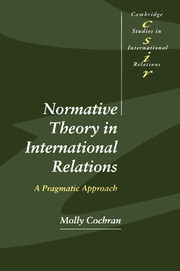Book contents
- Frontmatter
- Contents
- Acknowledgements
- Abbreviations
- Preface
- Introduction
- Part I Evaluating the impasse
- 1 Cosmopolitanism: Rawlsian approaches to international distributive justice
- 2 Communitarianism: Michael Walzer and international justice
- 3 Beyond the impasse? Hegelian method in the cosmopolitanism of Andrew Linklater and the Communitarianism of Mervyn Frost
- Part II Confronting the impasse
- Part III International ethics as pragmatic critique
- Conclusion
- References
- Index
- CAMBRIDGE STUDIES IN INTERNATIONAL RELATIONS
3 - Beyond the impasse? Hegelian method in the cosmopolitanism of Andrew Linklater and the Communitarianism of Mervyn Frost
Published online by Cambridge University Press: 22 September 2009
- Frontmatter
- Contents
- Acknowledgements
- Abbreviations
- Preface
- Introduction
- Part I Evaluating the impasse
- 1 Cosmopolitanism: Rawlsian approaches to international distributive justice
- 2 Communitarianism: Michael Walzer and international justice
- 3 Beyond the impasse? Hegelian method in the cosmopolitanism of Andrew Linklater and the Communitarianism of Mervyn Frost
- Part II Confronting the impasse
- Part III International ethics as pragmatic critique
- Conclusion
- References
- Index
- CAMBRIDGE STUDIES IN INTERNATIONAL RELATIONS
Summary
Introduction
The cosmopolitan/communitarian debate was not explicitly formulated or labelled as a debate in normative IR theory at the time Andrew Linklater and Mervyn Frost wrote the works which have since been definitive of cosmopolitan and communitarian positions. However, the tension of the ethical relationship between individuals and states in international practice discussed in Linklater's Men and Citizens in the Theory of International Relations (MC), and Frost's Towards a Normative Theory of International Relations (TNT) is the core tension upon which the debate was later constructed and articulated by Chris Brown and Janna Thompson (Brown 1992; Thompson 1992). Therefore, neither Linklater nor Frost is writing their respective works with something called the ‘cosmopolitan/communitarian debate’ in mind, but in these books they seek to resolve this core tension in order to facilitate the extension of moral inclusion and more just intersocietal relations. Thus, for the aim of evaluating the extent of this impasse and possibilities for accommodation within the debate, it is important to examine these books in particular and the work that has since followed from these writers.
I choose to examine the work of Linklater and Frost together for two connected reasons. First, it will be useful to examine in tandem a cosmopolitan and a communitarian attempt to reconcile the ethical relationships between individuals and states, in order to compare and contrast areas where accommodations are evident or likely.
- Type
- Chapter
- Information
- Normative Theory in International RelationsA Pragmatic Approach, pp. 78 - 118Publisher: Cambridge University PressPrint publication year: 1999



